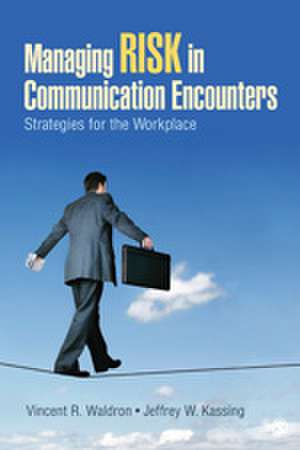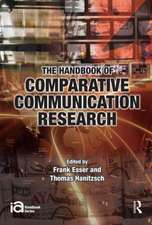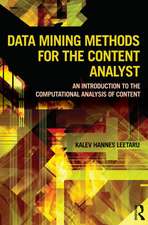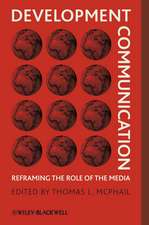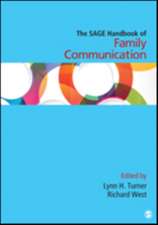Managing Risk in Communication Encounters: Strategies for the Workplace
Autor Vincent R. Waldron, Jeffrey (Jeff) W. Kassingen Limba Engleză Paperback – 7 apr 2010
Preț: 719.42 lei
Preț vechi: 877.34 lei
-18% Nou
Puncte Express: 1079
Preț estimativ în valută:
137.67€ • 147.21$ • 114.78£
137.67€ • 147.21$ • 114.78£
Carte tipărită la comandă
Livrare economică 18 aprilie-02 mai
Preluare comenzi: 021 569.72.76
Specificații
ISBN-13: 9781412966672
ISBN-10: 1412966671
Pagini: 272
Ilustrații: Illustrations
Dimensiuni: 152 x 229 x 15 mm
Greutate: 0.36 kg
Ediția:First
Editura: SAGE Publications
Colecția Sage Publications, Inc
Locul publicării:Thousand Oaks, United States
ISBN-10: 1412966671
Pagini: 272
Ilustrații: Illustrations
Dimensiuni: 152 x 229 x 15 mm
Greutate: 0.36 kg
Ediția:First
Editura: SAGE Publications
Colecția Sage Publications, Inc
Locul publicării:Thousand Oaks, United States
Cuprins
1. Introduction: A Theoretical Model for Managing Workplace Risk
The Anatomy of Workplace Risk
Forms of Risk
A Communicative Approach to Risk
A Risk Negotiation Framework
2. Delivering and Seeking Feedback
Why is Delivering and Seeking Feedback Important?
Key Research Studies
Negative Feedback and the Risk Negotiation Cycle
3. Managing Emotion
Why is Managing Emotion Important?
Key Research Studies
Coping with Emotion and the Risk Negotiation Cycle
4. Resisting Bullying and Harassment
Why is Resisting Bullying and Harassment Important?
Key Research Studies
Resisting Workplace Bullying and the Risk Negotiation Cycle
5. Negotiating Workplace Relationships
Why is Negotiating Workplace Relationships Important?
Key Research Studies
Managing Workplace Relationships and the Risk Negotiation Cycle
6. Monitoring Organization Romance
Why is Monitoring Organizational Romance Important?
Key Research Studies
Monitoring Organizational Romance and the Risk Negotiation Cycle
7. Dealing with Difference
Why is Dealing with Difference Important?
Key Research Studies
Dealing with Difference and the Risk Negotiation Cycle
8. Expressing Dissent
Why is Expressing Dissent Important?
Key Research Studies
Expressing Dissent and the Risk Negotiation Cycle
9. Proposing New Ideas
Why is Proposing New Ideas Important?
Key Research Studies
Proposing New Ideas and the Risk Negotiation Cycle
10. Responding to Difficult Team Members
Why is Responding to Difficult Team Members Important?
Key Research Studies
Responding to a Difficult Team Member and the Risk Negotiation Cycle
11. Conclusion: Risk and Next Generation Challenges
Relational Risks
Organizational Risks
Societal Risk
Risk Revisited
The Anatomy of Workplace Risk
Forms of Risk
A Communicative Approach to Risk
A Risk Negotiation Framework
2. Delivering and Seeking Feedback
Why is Delivering and Seeking Feedback Important?
Key Research Studies
Negative Feedback and the Risk Negotiation Cycle
3. Managing Emotion
Why is Managing Emotion Important?
Key Research Studies
Coping with Emotion and the Risk Negotiation Cycle
4. Resisting Bullying and Harassment
Why is Resisting Bullying and Harassment Important?
Key Research Studies
Resisting Workplace Bullying and the Risk Negotiation Cycle
5. Negotiating Workplace Relationships
Why is Negotiating Workplace Relationships Important?
Key Research Studies
Managing Workplace Relationships and the Risk Negotiation Cycle
6. Monitoring Organization Romance
Why is Monitoring Organizational Romance Important?
Key Research Studies
Monitoring Organizational Romance and the Risk Negotiation Cycle
7. Dealing with Difference
Why is Dealing with Difference Important?
Key Research Studies
Dealing with Difference and the Risk Negotiation Cycle
8. Expressing Dissent
Why is Expressing Dissent Important?
Key Research Studies
Expressing Dissent and the Risk Negotiation Cycle
9. Proposing New Ideas
Why is Proposing New Ideas Important?
Key Research Studies
Proposing New Ideas and the Risk Negotiation Cycle
10. Responding to Difficult Team Members
Why is Responding to Difficult Team Members Important?
Key Research Studies
Responding to a Difficult Team Member and the Risk Negotiation Cycle
11. Conclusion: Risk and Next Generation Challenges
Relational Risks
Organizational Risks
Societal Risk
Risk Revisited
Notă biografică
Vincent R. Waldron is Professor of Communication Studies at Arizona State University, where he teaches courses on communication in work and personal relationships. Professor Waldron received his Ph.D. from Ohio State University in 1989. Dr. Waldron¿s research explores how employees manage difficult workplace encounters, such as expressing intense emotion, exercising upward influence, and repairing damaged relationships. The author of two previous books on these subjects, Professor Waldron has published his work in such outlets as the Journal of Social and Personal Relationships, Management Communication Quarterly, and Communication Yearbook. Vince Waldron has been recognized as a Professor of the Year by the Carnegie Foundation for the Advancement of Teaching. He is chair-elect of the Interpersonal Communication Division of the National Communication Association. With his wife Kathleen and daughters Emily and Laura, Vince Waldron resides in Phoenix, Arizona.
Descriere
A theory-driven, narrative-based examination of the most daunting communication situations students will face in their working lives
